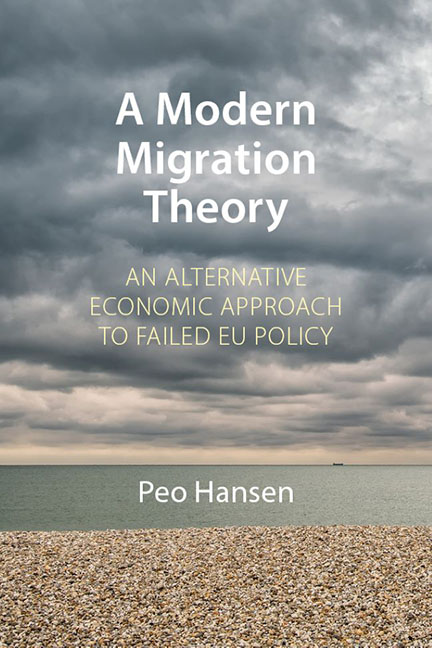Book contents
- Frontmatter
- Dedication
- Contents
- Preface and acknowledgements
- Foreword
- 1 Migration: the “mother of all problems”
- 2 The fiscal impact of migration
- 3 A modern migration theory
- 4 Demography, security and the shifting conjunctures of the European Union’s external labour migration policy
- 5 Labour migration in a sound finance policy logic
- 6 Why EU asylum policy cannot afford to pay demographic dividends
- 7 “We need these people”: refugee spending, fiscal impact and refugees’ real bearing on Sweden’s society and economy
- 8 Conclusion
- Bibliography
- Index
8 - Conclusion
Published online by Cambridge University Press: 20 December 2023
- Frontmatter
- Dedication
- Contents
- Preface and acknowledgements
- Foreword
- 1 Migration: the “mother of all problems”
- 2 The fiscal impact of migration
- 3 A modern migration theory
- 4 Demography, security and the shifting conjunctures of the European Union’s external labour migration policy
- 5 Labour migration in a sound finance policy logic
- 6 Why EU asylum policy cannot afford to pay demographic dividends
- 7 “We need these people”: refugee spending, fiscal impact and refugees’ real bearing on Sweden’s society and economy
- 8 Conclusion
- Bibliography
- Index
Summary
Now we see it, now we don’t
We will do what is needed or, as has been said elsewhere over the years: whatever it takes to handle the situation. […] Our job [the Swedish Riksbank’s] is to make sure that we do not run out of Swedish kronor. We can provide exactly as many Swedish kronor as we see fit.
This statement was made by the governor of the Swedish Riksbank, Stefan Ingves, in April 2020 (Swedish Television 2020). It was but one in a series of statements made in response to the Covid-19 pandemic. Prior to this the Riksbank had announced a smorgasbord of measures to mitigate the financial impact of the pandemic, among them an injection of SEK 500 billion of interest-free loans into the banks. At the press conference, Ingves described the SEK 500 billion as follows: “This is basically free money and we expect the Swedish banks to pass it on to Swedish companies” (Reuters 2020).
From the MMT perspective outlined in this book, Ingves’ statements are interesting in at least two respects. First, Ingves is incorrect in claiming that banks lend on central bank reserves; they do not. In the Riksbank's (2020) press release this mistaken conception was reiterated several times: “The Riksbank is offering the banks up to SEK 500 billion against collateral for onward lending to non-financial companies operating in Sweden.” The statements derive from the inaccurate “money multiplier” theory. Similar to the “household analogy” and the “budget constraint”, the money multiplier makes up yet another error within orthodox economics that still holds sway among central bank and finance ministry officials, as well as in macroeconomic textbooks and the news media.1 Second, and more important for our purposes here, Ingves is right on the money when he speaks of “free money” and, especially, when clarifying that the Riksbank can provide as many Swedish kronor as it wants. In Chapter 3 I quoted Alan Greenspan saying something very similar about the federal government's money creation ability.
- Type
- Chapter
- Information
- A Modern Migration TheoryAn Alternative Economic Approach to Failed EU Policy, pp. 171 - 200Publisher: Agenda PublishingPrint publication year: 2021



